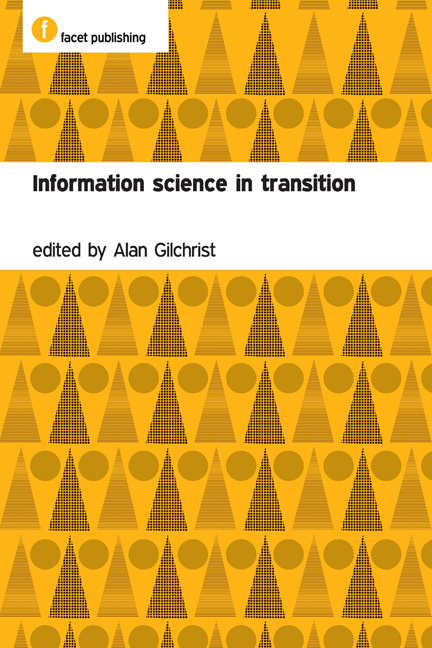Book contents
- Frontmatter
- Contents
- Contributors
- Preface
- Editorial
- Guest Editorial: Meeting the challenge
- 1 Fifty years of UK research in information science
- 2 Smoother pebbles and the shoulders of giants: the developing foundations of information science
- 3 The last 50 years of knowledge organization: a journey through my personal archives
- 4 On the history of evaluation in IR
- 5 The information user: past, present and future
- 6 The sociological turn in information science
- 7 From chemical documentation to chemoinformatics: 50 years of chemical information science
- 8 Health informatics: current issues and challenges
- 9 Social informatics and sociotechnical research – a view from the UK
- 10 The evolution of visual information retrieval
- 11 Information policies: yesterday, today, tomorrow
- 12 The disparity in professional qualifications and progress in information handling: a European perspective
- 13 Electronic scholarly publishing and Open Access
- 14 Social software: fun and games, or business tools?
- 15 Bibliometrics to webometrics
- 16 How I learned to love the Brits
- Index
12 - The disparity in professional qualifications and progress in information handling: a European perspective
Published online by Cambridge University Press: 08 June 2018
- Frontmatter
- Contents
- Contributors
- Preface
- Editorial
- Guest Editorial: Meeting the challenge
- 1 Fifty years of UK research in information science
- 2 Smoother pebbles and the shoulders of giants: the developing foundations of information science
- 3 The last 50 years of knowledge organization: a journey through my personal archives
- 4 On the history of evaluation in IR
- 5 The information user: past, present and future
- 6 The sociological turn in information science
- 7 From chemical documentation to chemoinformatics: 50 years of chemical information science
- 8 Health informatics: current issues and challenges
- 9 Social informatics and sociotechnical research – a view from the UK
- 10 The evolution of visual information retrieval
- 11 Information policies: yesterday, today, tomorrow
- 12 The disparity in professional qualifications and progress in information handling: a European perspective
- 13 Electronic scholarly publishing and Open Access
- 14 Social software: fun and games, or business tools?
- 15 Bibliometrics to webometrics
- 16 How I learned to love the Brits
- Index
Summary
Abstract
This paper is a personal view of the development of the role(s) of information professionals in the 50 years since IIS was founded. One of the justifications for the formation of IIS was that the then current professional bodies were not relevant to the needs of those employed in industrial information services. This paper reviews briefly the situation when IIS was formed, from the viewpoint of professional requirements and the developments since. The conclusion is drawn that today's information world, very different from that of 50 years ago, faces similar problems of a lack of suitable qualifications and a confusion in the roles of different actors in the field.
Introduction
The suggested brief I received from the Editor of this compilation marking 50 years since the foundation of the Institute of Information Scientists was to cover the European aspects of the IIS, such as they were. I have added the last phrase because I am not certain that any professional aspect of the role of IIS outside the UK was considered at the foundation. I was, at a time shortly after the foundation, a student at the institution where Jason Farradane, a founding father, taught his brand of information science. One did not discuss the politics of professional bodies within the course, one listened to the opinions on certain aspects of the way information systems and services were created, managed, researched and used and took note of the opinions. The more committed of the students actually joined IIS, although there was no pressure to do so.
I have drawn upon my experiences as a member of the IIS in ‘Europe’ for a number of years, as a resident consultant to the European Commission and subsequently as the Director of the European Society for Information Dissemination in Chemistry (EUSIDIC) and the International Council for Scientific and Technical Information (ICSTI), in creating this contribution on certain aspects of the way the information sector has developed over the last 50 years, from the almost exclusive domain of librarianship to a regular topic on the front pages of newspapers, TV and radio, driven by a global availability and distribution system.
- Type
- Chapter
- Information
- Information Science in Transition , pp. 283 - 298Publisher: FacetPrint publication year: 2009

